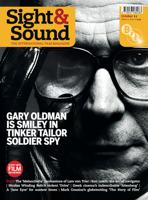Primary navigation


Please view our back issues page for more information about obtaining previous months issues, dating back to 1995.
 On Ken Loach
On Ken LoachAs the BFI launches a major Ken Loach retrospective, Antonia Bird, Luc Dardenne, Tony Hibbert (online exclusive), Peter Kosminsky and Jimmy McGovern pay tribute to the director’s work over a career spanning almost half a century
PLUS (in the magazine): further tributes from Martin Compston, Nell Dunn, Tony Garnett and Jonathan Morris
PLUS (in the magazine): The social navigator: During a directing career spanning almost half a century, Ken Loach’s work has become a byword for brand of naturalistic, socially conscious British filmmaking. But there’s more to him than that, says John Hill
PLUS (in the magazine): Michael Brooke welcomes back a lost Loach film from 1969
 Persona non grata: Lars von Trier’s Nazi rebellion
Persona non grata: Lars von Trier’s Nazi rebellionLars von Trier’s controversial outburst in Cannes this year was not entirely out of character, finds Nick James
PLUS (in the magazine): the Danish controversialist talks to Nick James about his dreamily apocalyptic new film Melancholia (and his Nazi gaffe)
 Lost and found: See You in the Morning
Lost and found: See You in the MorningAlan J. Pakula is best known for 1970s paranoia, but See You in the Morning is a more personal later work, says Peter Tonguette
Despite inevitable compression, Tinker Tailor Soldier Spy the movie captures the mood of John le Carré’s source novel, says John Sutherland
PLUS Gary Oldman talks to James Bell about how he made the role of George Smiley his own
During a directing career spanning almost half a century, Ken Loach’s work has become a byword for brand of naturalistic, socially conscious British filmmaking. But there’s more to him than that, says John Hill
PLUS Michael Brooke welcomes back a lost Loach film from 1969
PLUS Antonia Bird, Martin Compston, Luc Dardenne, Nell Dunn, Tony Garnett, Peter Kosminsky, Jimmy McGovern and Jonathan Morris pay tribute to Loach’s films and working methods
Interviewing Lars von Trier about his dreamily apocalyptic new film Melancholia, Nick James was under strict instruction not to broach the subject of Nazism. But the Danish controversialist had other ideas
In recent years British TV has given little airtime to serious coverage of cinema. But all that is changing with the transmission of a 15-hour documentary by Mark Cousins that offers a truly global perspective. Ian Christie immerses himself in The Story of Film
In the extraordinary new Greek film Attenberg, a woman fascinated by David Attenborough’s nature programmes confronts the mysteries of human behaviour. Director Athina Rachel Tsangari talks to Jonathan Romney
A director with an ‘outsider’s eye’ is unleashed on a British literary classic: it’s a familiar strategy, but it pays dividends with Cary Joji Fukunaga’s Jane Eyre, says Claire Monk
Best known for his Copenhagen-set Pusher trilogy, Danish director Nicolas Winding Refn brings a European style and sensibility to his first American film, the gripping crime-and-cars thriller Drive. He talks to Nick Roddick
 Film review: The Debt
Film review: The DebtA sturdy psychological suspense thriller about a botched Mossad kidnap mission, The Debt focusses intriguingly on the dilemmas of a female lead agent until an implausible last act, says Kate Stables
 Film of the month: Post Mortem
Film of the month: Post MortemA neurotic Chilean mortuary assistant in the year of Pinochet’s coup is the focus of Post Mortem, a character study that’s every bit as distinctive and chilling as Pablo Larraín’s last film Tony Manero. By Jonathan Romney
 DVD: Face to Face
DVD: Face to FaceAn intense, stripped-bare psychodrama, Face to Face reminds us why Bergman’s films are essential viewing, says Michael Atkinson
 Film review: Tinker Tailor Soldier Spy
Film review: Tinker Tailor Soldier SpyIn the hands of Let the Right One In director Tomas Alfredson, this feature adaptation preserves, even enhances, the atmosphere of mistrust and cynical insecurity in John le Carré’s spy-catcher novel, says Philip Kemp
 Film review: Drive
Film review: DriveRyan Gosling’s hot rod / getaway driver harks back to the old cool of Ryan O’Neal and Steve McQueen in Danish crime auteur Nicolas Winding Refn’s classically pulpy Los Angeles debut. Wally Hammond enjoys the ride